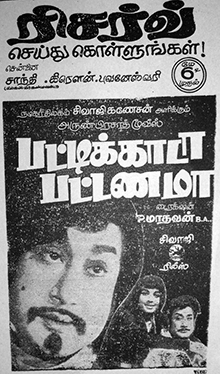Pattikada Pattanama
| Pattikada Pattanama | |
|---|---|
 Theatrical release poster | |
| Directed by | P. Madhavan |
| Story by | Bala Murugan |
| Based on | The Taming of the Shrew by William Shakespeare |
| Produced by | P. Madhavan |
| Starring | Sivaji Ganesan Jayalalithaa |
| Cinematography | P. N. Sundaram |
| Edited by | R. Devarajan |
| Music by | M. S. Viswanathan |
Production company | Arun Prasad Movies |
| Distributed by | Sivaji Films |
Release date |
|
Running time | 150 minutes[1] |
| Country | India |
| Language | Tamil |
Pattikada Pattanama (transl. Village or Town?) is a 1972 Indian Tamil-language romantic comedy film produced and directed by P. Madhavan and written by Bala Murugan. The film stars Sivaji Ganesan and Jayalalithaa. The film deals with Kalpana, an urban woman who marries a villager Mookaiyan. After marriage, differences of opinion arise between the couple as Mookaiyan raises objections about city culture, leading to their separation. The rest of the film is whether Kalpana reforms and the couple reunite or not.
Pattikada Pattanama is based on the William Shakespeare comedy The Taming of the Shrew. It was released on 6 May 1972. The film was commercially successful, running for over 175 days in theatres, thereby becoming a silver jubilee film. It is the only black and white Tamil film to cross the ₹1 crore (US$120,000) mark in collections in the history of Tamil cinema.[2] It also won the National Film Award for Best Feature Film in Tamil, and two Filmfare Awards South: Best Film – Tamil and Best Actress – Tamil (Jayalalithaa).
Plot
[edit]Mookkaiyan belongs to a well-to-do family and lives in the village Sholavandan. He is held in high esteem by the villagers for his prowess. One day, his uncle Chockalingam, Chockalingam's wife Bama and their foreign-educated daughter Kalpana come to Sholavandan to participate in the Mariamman festival. Kalpana is fascinated by Mookaiyan's prowess; her mother disapproves of Kalpana's emotional reaction while her father is happy. Bama settles a young man of Madurai to marry Kalpana. Moved by the pleas of Chockalingam, Mookaiyan goes to the bridegroom's house and brings back Kalpana, saying that he has the right by birth to marry her.
Married life starts well for Mookaiyan and Kalpana, but before long differences arise because of their different backgrounds. At Kalpana's birthday party, Mookaiyan objects to drinking and dancing by her hippie friends. He beats Kalpana, and she leaves him to join her mother. A lawyer's notice for divorce is received. Mookaiyan futilely tries to make Bama understand the situation. The mother and daughter are adamant and Mookaiyan returns home determined to teach them a lesson.
Kalpana, having been impregnated by Mookaiyan some time earlier, gives birth to a child. In her anxiety to save Kalpana from further involvements, Bama leaves the child in an orphanage. Kalpana is shocked by this act of her mother. By the time she goes to recover the child, Mookaiyan has already taken it away. Kalpana beseeches her father to get the child from Mookaiyan. Unexpectedly, Mookaiyan comes there to deliver an invitation card for his marriage with his cousin Rakkamma. Kalpana and her parents are now repentant.
Kalpana goes alone to Mookaiyan's house and asks her husband to leap over their child and then tie the thali to another girl. To her surprise, Kalpana discovers that the marriage being celebrated is that of a different man named Mookaiyan, while her husband did no injustice to her; she falls at her husband's feet and the family reunites.
Cast
[edit]- Sivaji Ganesan as Mookkaiya Servai/Mukesh[3]
- Jayalalithaa as Kalpana[4]
- Shubha as Rakkamma[3]
- S. N. Lakshmi as Mookkaiya's grandmother[5]
- Gandhimathi as Vellaiyammal's friend
- V. K. Ramasamy as Sokkalingam[3]
- Sukumari as Bama[3]
- M. R. R. Vasu as Minor[3]
- Manorama as Vellaiyammal[3]
- Senthamarai as a villager
- Samikannu as Butler Kanthasamy[3]
- Kathadi Ramamurthy as the rickshaw man[3]
- Pakoda Kadhar as Puliyotharai
- Pattom Sadan as Thivitti
- Veeraragavan as Rathnam
- Papji as Sankar
Production
[edit]Pattikada Pattanama was produced and directed by P. Madhavan,[6] and based on the William Shakespeare comedy The Taming of the Shrew.[7][8] The film's title was derived from a song from Mattukkara Velan (1970).[9] Malayalam actress Sukumari appeared as the mother of Jayalalithaa in the film, despite being older than Jayalalithaa by only a few years.[10][11] Manorama, in portraying her character, spoke in Madurai dialect.[12] The film marked the acting debut of Shubha in Tamil. Cinematography was handled by P. N. Sundaram and the editing by R. Devarajan. The film's final length was 4,395 metres (14,419 ft).[13]
Soundtrack
[edit]The soundtrack was composed by M. S. Viswanathan, and lyrics were written by Kannadasan.[14][15] The song "Ennadi Rakkamma" is set in the Carnatic raga known as Shanmukhapriya.[16] It was well received and remains a cult classic. The song was later remixed by D. Imman in Vaadaa (2010).[17] D. Karthikeyan of The Hindu writing about T. M. Soundararajan mentioned that his "folksy number Ennadi Rakkamma Pallakku from Pattikada Pattanama still makes people go crazy with its rustic beats and beautiful rendition and the song is a must in cultural festivals in Madurai".[18] The song "Kettukodi" was remixed by Kavi Periyathambi in Pandi Oliperukki Nilayam (2012).[19]
| No. | Title | Singer(s) | Length |
|---|---|---|---|
| 1. | "Ambikaiye Easwariye" | T. M. Soundararajan | 4:24 |
| 2. | "Adi Ennadi Rakkamma" | T. M. Soundararajan | 2:50 |
| 3. | "Adi Ennadi Rakkamma" (sad) | T. M. Soundararajan | 3:37 |
| 4. | "Kettukodi Urumi" | T. M. Soundararajan, L. R. Eswari | 4:27 |
| 5. | "Muthu Solai" | P. Susheela | 3:47 |
| 6. | "Nalvazhthu Naan Soluvaen" | T. M. Soundararajan | 3:29 |
| Total length: | 22:34 | ||
Release and reception
[edit]Pattikada Pattanama was released on 6 May 1972,[20] and distributed by Sivaji Films.[21] The film became a commercial success, running for over 175 days in theatres, thereby becoming a silver jubilee film.[22][23] Politician K. Kamaraj praised the film, saying it demonstrated the need to practice one's culture and the traditions of "one wife for one husband". The Tamil magazine Ananda Vikatan in a review dated 28 June 1972, praised Ganesan's energetic performance and the outdoor cinematography, but called the film a usual old wine in new bottle story.[24] The film won two Filmfare Awards South: Best Film – Tamil and Best Actress – Tamil (Jayalalithaa),[25] and the National Film Award for Best Feature Film in Tamil.[6][26]
References
[edit]- ^ Dhananjayan 2014, p. 228.
- ^ "மதுரையில் முதல்முறை 5 லட்சம் வசூலித்த திரைப்படம் எது தெரியுமா?". News18 (in Tamil). 7 May 2022. Archived from the original on 7 May 2022. Retrieved 2 July 2022.
- ^ a b c d e f g h ராம்ஜி, வி. (7 May 2020). "சோழவந்தான் மூக்கையா சேர்வையைத் தெரியும்தானே? – 'பட்டிக்காடா பட்டணமா' 48 வருடங்கள்!". Hindu Tamil Thisai (in Tamil). Archived from the original on 10 May 2020. Retrieved 18 May 2020.
- ^ Rangan, Baradwaj (7 December 2016). "Off-screen deity, on-screen goddess". The Hindu. Archived from the original on 11 December 2016. Retrieved 11 December 2018.
- ^ "செல்லுலாய்ட் பெண்கள்" [Celluloid girls]. Dinakaran (in Tamil). 6 May 2019. Archived from the original on 2 May 2021. Retrieved 9 March 2021.
- ^ a b "Twentieth National Awards for Films". India: Ministry of Information and Broadcasting. Archived from the original on 5 November 2013. Retrieved 20 February 2018.
- ^ Guy, Randor (18 September 2009). "Arivaali 1963". The Hindu. Archived from the original on 23 September 2018. Retrieved 19 May 2017.
- ^ Radhakrishnan, Sruthi (23 April 2018). "400 years later, Shakespeare still remains relevant in Indian cinema". The Hindu. Archived from the original on 4 December 2018. Retrieved 4 December 2018.
- ^ ராம்ஜி, வி. (7 May 2020). "அப்போது பி.மாதவன்; இப்போது கவுதம் வாசுதேவ்மேனன் - பாட்டுவரியை படத்தலைப்பாக்கிய இயக்குநர்கள்". Hindu Tamil Thisai (in Tamil). Archived from the original on 20 March 2023. Retrieved 24 March 2023.
- ^ Sangeeta (4 July 2008). "Mother of all roles". The Hindu. Archived from the original on 25 January 2016. Retrieved 12 September 2015.
- ^ Ramachandran, Mythily (2 April 2013). "Sukumari, a tribute". Gulf News. Archived from the original on 18 November 2017. Retrieved 18 November 2017.
- ^ "Actor Manorama – She ruled the screen". The Hindu. 12 October 2015. Archived from the original on 4 December 2018. Retrieved 12 October 2015.
- ^ "151–160". Nadigarthilagam.com. Archived from the original on 4 March 2016. Retrieved 20 February 2018.
- ^ "Pattikada Pattanama Tamil Film EP Vinyl Record by MS Viswanathan". Mossymart. Archived from the original on 14 June 2021. Retrieved 14 June 2021.
- ^ "Pattikada Pattinama (1972)". Music India Online. Archived from the original on 4 December 2018. Retrieved 4 December 2018.
- ^ Sundararaman 2007, p. 121.
- ^ "Double delight for Sundar C". The Times of India. 25 September 2008. Archived from the original on 10 April 2016. Retrieved 19 May 2017.
- ^ Karthikeyan, D. (17 July 2012). "TMS, the unsung hero of Tamil film world". The Hindu. Archived from the original on 25 January 2016. Retrieved 12 September 2015.
- ^ Ashok Kumar, S. R. (4 August 2012). "Audio Beat: Pandi Oliperukki Nilayam". The Hindu. Archived from the original on 23 August 2022. Retrieved 23 August 2022.
- ^ "ஜெயலலிதா நடித்த திரைப்படங்களின் பட்டியல்" [List of films starring Jayalalithaa]. Dinamani (in Tamil). 6 December 2016. Archived from the original on 22 September 2018. Retrieved 22 September 2018.
- ^ "பட்டிக்காடா பட்டணமா" [Village or Town?]. Dinamani (in Tamil). 1 May 1972.
- ^ Selvaraj, N. (20 March 2017). "வெள்ளி விழா கண்ட தமிழ் திரைப்படங்கள்" [Tamil films that completed silver jubilees]. Thinnai (in Tamil). Archived from the original on 29 March 2017. Retrieved 4 December 2018.
- ^ Ganesan & Narayana Swamy 2007, p. 242.
- ^ Dhananjayan 2014, p. 229.
- ^ The Times of India Directory and Year Book Including Who's who. Bennett Coleman & Co. Ltd. 1984. p. 234. Retrieved 8 June 2021.
- ^ Ganesan & Narayana Swamy 2007, p. 246.
Bibliography
[edit]- Dhananjayan, G. (2014). Pride of Tamil Cinema: 1931–2013. Blue Ocean Publishers. OCLC 898765509.
- Ganesan, Sivaji; Narayana Swamy, T. S. (2007) [2002]. Autobiography of an Actor: Sivaji Ganesan, October 1928 – July 2001. Sivaji Prabhu Charities Trust. OCLC 297212002.
- Sundararaman (2007) [2005]. Raga Chintamani: A Guide to Carnatic Ragas Through Tamil Film Music (2nd ed.). Pichhamal Chintamani. OCLC 295034757.
External links
[edit]
- 1972 films
- 1970s Indian films
- 1970s Tamil-language films
- 1972 romantic comedy films
- Best Tamil Feature Film National Film Award winners
- Films based on The Taming of the Shrew
- Films directed by P. Madhavan
- Films scored by M. S. Viswanathan
- Indian films based on plays
- Indian romantic comedy films
- Tamil-language Indian films

